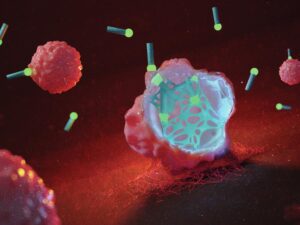Synthesis of Interactive Peptide Nanostructures in Living Systems
Max Planck Institute for Polymer Research, Germany
Abstract- We explore controlled chemical reactions in complex living systems to generate drug molecules, synthesize peptide nanofibers, or build new cellular compartments. The introduction of bioresponsive groups enables us to control peptide self-assembly inside the living cell. These groups react in a controlled fashion with cellular stimuli, including pH, reactive oxygen species, glutathione, and light. The synthetic intracellular peptide nanostructures can interfere with cell respiration, metabolism, they can induce controlled cell death, or activate T-cells. Additionally, peptide nanostructures can be integrated into the extracellular matrix, where they facilitate virus binding and enhance the uptake of viral vectors. To optimize the amphiphilic peptide sequences of self-assembling peptides with regard to their multiscale structure formation and bioactivity, we employ data mining and machine learning tools.

Figure 1. Bioresponsive caged peptide monomers enter living cells and undergo chemical transformations initiated by cellular stimuli and form supramolecular peptide nanofibers that can affect cellular processes.
- Chagri, S.; Ng, D. Y. W.; Weil, T. Nat. Rev. Chem. 2022, 6, 320–338.
- Pieszka, M.; Han, S.; Volkmann, C.; Graf, R.; Lieberwirth, I.; Landfester, K.; Ng, D. Y. W.; Weil, T. J. Amer. Chem. Soc. 2020, 142, 37, 15780–15789.
- Zhou, Z.; Maxeiner, K.; Moscariello, P; Xiang, S.; Wu, Y.; Ren, Y.; Whitfield, C. J.; Xu, L.; Kaltbeitzel, A.; Han, S.; Mücke, D.; Qi, H.; Wagner, M.; Kaiser, U.; Landfester, K.; Lieberwirth, I.; Ng, D. Y.W.; Weil, T. J. Amer. Chem. Soc. 2022, 144, 27, 12219–12228.
- Roth, P.; Meyer, R.; Harley, I; Landfester, K.; Lieberwirth, I.; Wagner, M.; Ng, D. Y. W.; Weil, T. Nat. Syn. 2023, 2, 980–988.
- Kaygisiz, K.; Rauch-Wirth, L.; Dutta, A.; Yu, X. Q.; Nagata, Y.; Bereau, T.; Münch, J.; Synatschke, C. V.; Weil T. Nat. Commun. 2023, 14, 1, 5121.
- Ren, Y.; Zhou, Z.; Maxeiner, K.; Kaltbeitzel, A.; Harley, I.; Xing, J.; Wu, Y.; Wagner, W.; Landfester, K.; Lieberwirth, I.; Weil, T.; Ng, D. Y. W. 2024, J. Amer. Chem. Soc. 146, 17, 11991.
Bio– Prof. Dr. Tanja Weil joined the Max Planck Society in 2017 as one of the directors of the Max Planck Institute for Polymer Research, heading the division “Synthesis of Macromolecules”. She studied chemistry (1993–1998) at the TU Braunschweig (Germany) and the University of Bordeaux I (France) and completed her PhD at the MPI for Polymer Research under the supervision of K. Müllen. In 2003, she received the Otto Hahn Medal of the Max Planck Society. From 2002 to 2008 she managed different leading positions at Merz Pharmaceuticals GmbH (Frankfurt) from Section Head Medicinal Chemistry to Director of Chemical Research and Development. In 2008 she accepted an Associate Professor position at the National University of Singapore. Tanja Weil joined Ulm University as Director of the Institute of Organic Chemistry III / Macromolecular Chemistry in 2010. She has received numerous competitive funding at both national and international level including a Synergy Grant of the European Research Council (ERC). She serves in many advisory boards and steering committees: she is a member of the senate of the German Research Foundation, a member of the senate of the Leibniz Association and of the Leibniz evaluation panel. Tanja is an associate editor for JACS and a member of the editorial advisory board of ACS Nano. Her scientific interests focus on innovative synthesis concepts to achieve functional macromolecules and hybrid materials to solve current challenges in biomedicine and material science.

